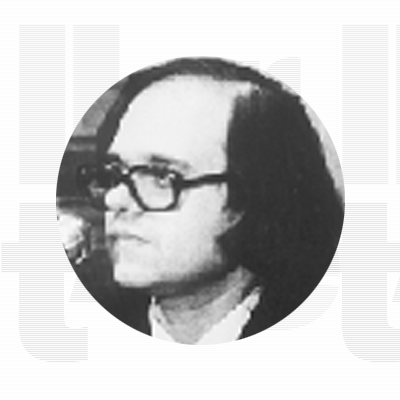Pere Gimferrer
(Nou diccionari 62 de la literatura catalana)
Pere Gimferrer (Barcelona, 1945) has long been one of the most prestigious Catalan writers. His poetic work has been distinguished with the most prestigious Catalan and Spanish awards. His considerable body of, extremely high quality translation work includes an impressive list of European classics in English and French. As a literary and art critic, his exquisite taste has been reflected in numerous articles and in monographs on Foix, Max Ernst, Tàpies, Miró, etc. He is a member of the Spanish Royal Academy of Language and of the Royal Academy of Belles Lletres of Barcelona.
He began to study Arts and Law at the University of Barcelona but did not finish the degrees. He is one of the directors of the publishing house Seix Barral. He has translated into Spanish Ramon Llull, Ausiàs March, Beckett, Sade, Joan Brossa, and Gabriel Ferrater.
Barcelona, 1945. Poet, prose writer and translator
Since 1985, he is member of the Spanish Royal Academy of Language, he has written as a literary critic for Destino, Serra d'Or, Ínsula, and is also published in the newspapers El País and ABC.
A film enthusiast, he has written as a critic for Film ideal. The tangible beginning of his career as a poet was Mensaje del Tetrarca (Message from the Tetrarch - 1963). With Arde el mar (The Sea Is Burning - winner of the 1966 Poetry Prize) he achieved a highly personal re-reading of the surrealist experience. In La muerte en Beverly Hills (Death in Beverley Hills - 1968) his stance is still experimental as he advances towards a demolition of language. The volume Poemas 1963-1969 (Poems 1963 - 1969) brought together his poetry written in Spanish. In sum, his work to this point had already earned him unanimous recognition as one of the most original poets born after the Civil War and one who had most modified the Spanish literary panorama with the innovation of his proposals.
At this time he was drawing attention to the influence of living writers whom he knew personally, for example Vicente Aleixandre and Octavio Paz, and of others he had been reading such as Lautréamont, Lorca and Wallace Stevens and published an excellent Antología de la poesía modernista (Anthology of Modernist Poetry - 1969). In 1970 he wrote and published Els miralls, his first collection of poetry in Catalan, which was soon to be followed by Hora foscant (Darkening Hour - 1972) and Foc cec (1973).
His impact on Catalan poetry was similar to that which he had had on Spanish literature in the 1960s. His is discursive, meta-literary poetry that attempts to link up with different moments of the literary tradition and the Baroque and avant-garde movements. He explores, on the basis of a poetics of the instant, the tenuous frontiers between real reality and artistic reality. He would subsequently publish L'espai desert (Deserted Space - 1977), which received the "Lletra d'or" Prize. In this work, following T. S. Eliot's example, he planned a long poem that was criss-crossed through with a subterranean structure of amorous, sexual reflection in a series of verbal motifs and temporal manoeuvres. In the words of Juan Goytisolo, "each poetic sequence is consecrated to the different reasons for the poet's dissidence with regard to the reality that oppresses him".
In 1981, he collected all his earlier work in Mirall, espai, aparicions (Mirror, Space, Apparitions), this volume including a new book, Aparicions. In 1991 he published in the newspaper Avui a poem for the stage he had written in 1971: Francesc Fontanella. He then published two collections of poems, El vendaval (The Gale - 1989) and La llum (Light - 1991), in which the visual note and epigram would dominate. Mascarada (Masquerade - 1996) is a long unitary poem in which, with a Parisian background (cityscape and literary references) he comes back to themes of the amorous experience pushing it to extremes of crudity and provocation. His most recent published work, L'agent provocador (Agent Provocateur - 1998), is to be read as being in dialogue with the previous work. His poetic prose reflects on how the "I" becomes self-conscious in the act of writing, a shift from the active "I" to the reflective "I", combined with autobiographical details.
As a prose writer, he has produced some highly original texts, Dietari. 1979-1980 (Diary. 1979 - 1980), published in 1981, and Segon dietari. 1980-1982 (Second Diary. 1980 - 1982), published in 1982. These two books consist of the articles he regularly published in the Barcelona newspaper El Correo Catalán. There are a number of recurring themes: the stance of refusal and silence adopted by intellectuals at specific moments of history; a critique of power and politics; the poet and artist in a constant process of learning; his urge to define the Catalan cultural moment; personal literary, artistic and cinematographic evocations. He has made - in the words of Josep M. Castellet - a great discovery: "historic simultaneity". Gimferrer has also written a novel, Fortuny (Fortuny - 1983), which was awarded the Ramon Llull Prize, and the literary essays Radicalidades (Radicalisms - 1978), and Lecturas de Octavio Paz (Readings of Octavio Paz - 1980) in Spanish, while his notable publications in this genre in Catalan are La poesia de J.V. Foix (The Poetry of J. V. Foix - 1974), the anthologies of Marià Manent and Joan Brossa (1980), and his prologue to the poetry of Màrius Torres.
Again, he has written essays on Max Ernst, Antoni Tàpies and Joan Miró. These texts are a chronicle of readings, a tribute to writers and artists, original - in the sense of personal - contributions from the standpoint of the art critic, while at once constituting a fundamental inquiry into his own writing. Five volumes of his complete works have been published.
Copyright text © 2000 Edicions 62




